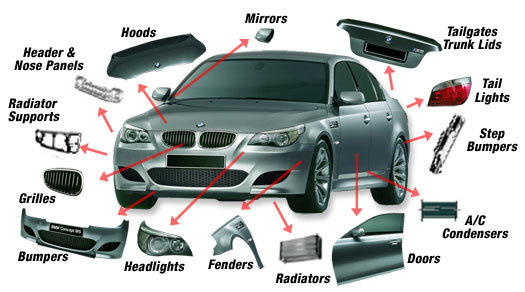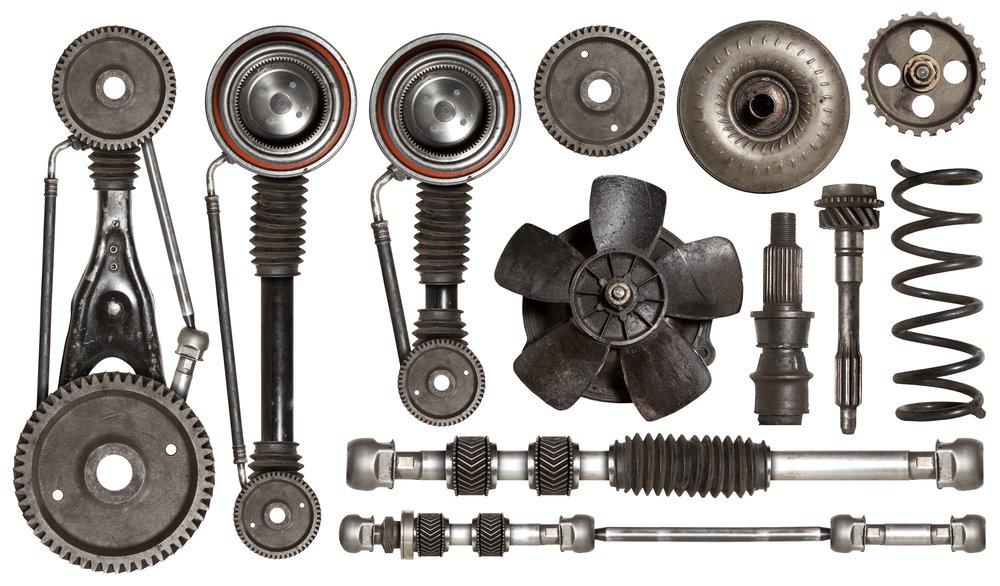20 Best Pieces Of Advice For Deciding On Car Parts
20 Best Pieces Of Advice For Deciding On Car Parts
Blog Article
Ten Tips To Take Into Consideration About The Condition Of Car Parts (New Or Used)
In order to determine the best choice between new and used car components, you should take into account their state of repair. Here are the top ten suggestions you must consider, along together with their pros, advantages and cons:
1. Know the role of the part and the Criticality
Tip: Prioritize the purchase of new components for crucial safety components (such as steering or brakes).
Advantages: New components improve reliability and decrease the chances of failure.
Cons: Used components might seem attractive due to their lower price, but they may cause safety issues for important systems.
2. Take into consideration the wear and tear issue
Tip: Assess the impact of wear on a piece's performance.
Pros: All brand new components provide optimal performance.
Pros: In good condition, used parts can still have a lower life expectancy.
3. Assess the Part's Longevity
Make use of used parts to make long-lasting components (e.g. the rims and body panels).
Cons The main reason is that used parts are usually cheaper than brand new ones however they aren't as functional.
Cons: Problems that are difficult to detect (such as hidden rust) can appear later on.
4. Check used parts for damage.
Tip: Physically inspect used items for cracks, corrosion, or excessive wear before buying.
Pros: Used parts should be of a minimum standard of quality.
Cons: It's impossible to examine every part thoroughly, particularly on the internet.
5. Compare New and Used Products
Make use of recycled components to fill in the gap if you're unable to locate new ones or they are too cost-effective.
Cons: Your car will operate smooth.
The cons: Parts could need to be replaced sooner than the new ones.
6. Verify the compatibility of used Parts and their History
Tips - Make sure the components you use are in line with the specifications of your car and also have a good service record.
Pros: Reduces the chance of purchasing a component that isn't right or defective.
Cons: Insufficient information about the past of used parts may lead to uncertainty.
7. Take into consideration Refurbished and Rebuilt parts.
TIP: You can locate recycled parts, such as transmissions and alternators, which are a great alternative to new and used.
Pros They are more reliable and less expensive than used parts.
Pros: Quality is dependent on the refurbishing process and vendor reputation.
8. Budget Constraints
Tips: For parts that aren't essential (e.g., trim or interior accessories) Used parts can be a cost-effective option.
Pros: Saves money while still meeting functional needs.
Cons: Older parts could have a different appearance and performance than new parts.
9. Check for Warranty
You can get limited warranties on some used components if you purchase the parts from reliable sellers.
Pros: Gives assurance in the event of defects or failures.
Cons: Parts that come with warranties that are in use can be costly and difficult to find.
10. Understand the Impact on Resale Price
TIP: Buying brand new parts for your vehicle can boost its resale worth, particularly when it requires major repairs.
Benefits include: Buyers are more inclined to believe vehicles with quality replacements.
Cons: Old car parts may not be perceived as adding the same value.
Final Thoughts on Weighing Both Pros and Con
New parts offer many benefits:
Ensured performance, compatibility, and durability.
Many manufacturers offer a warranty.
Choose this for your critical systems to increase the value of resales.
The cons of new parts:
The cost of the initial investment is increased.
The older or rarer cars may be harder to locate.
Advantages of used parts:
Cost-effective - especially for components that aren't essential.
Older models, or discontinued models are now readily available.
Eco-friendly – Recycles existing material
The disadvantages of using used parts
Risk of defect, wear and shorter lifespan.
Warranty limited or non-existent.
Requires careful inspection to ensure quality.
These suggestions can assist you in making a sound choice between purchasing new or used parts for your car. View the recommended transportešanas iekarta car parts par geely cars for site info including gadi ke parts, ford's auto salvage, buy auto parts by vin number, part number lookup, autosupply reviews, parts l, latvia auto parts, aut0 parts near me, auto auto salvage, bmw part no and more.
The Ten Most Important Things To Think About Concerning Advanced Systems
Replacement parts for high-tech systems like sensors, electronics, and other advanced components are crucial. These systems are often different from mechanical components in that they require specific considerations. Here are 10 important tips to consider, with pros and cons:
1. Understanding the complexity of the System
Tip: Research the complexity of the sophisticated system (e.g. informationtainment systems or adaptive cruise control or collision-avoidance systems) prior to purchasing any parts.
Pros: Understanding the complexities of your vehicle can help you prevent purchasing parts that aren't compatible.
Cons: A lot of advanced systems require specialist knowledge, which can lead to greater costs for repairs and replacement.
2. Check your vehicle for Software Compatibility
Verify that the part you purchase is compatible with your car's software. Certain parts require calibration or software updates.
Cons It isn't compatible with other systems.
Cons: resolving software-related issues can be expensive and time-consuming especially if you want to upgrade your system.
3. Consider OEM instead of. Aftermarket options for Advanced Systems
Tips: If you're seeking high-tech components that perform flawlessly, OEM parts (Original Equipment Manufacturing) may be required. Parts from aftermarket may not have the same capabilities.
OEM components are compatible with the system that came from the beginning and ensure the integrity of the system.
Pros: OEM parts could be quite expensive compared to alternatives from the aftermarket.
4. Look for Integrated Systems as well as Modular Systems
Tips. Certain systems with advanced features have modular components, meaning that they require several parts to work. Make sure you have all the parts necessary for the system to function effectively.
Advantages: Modular systems are simpler to upgrade and repair.
Cons: Misunderstanding the modularity can lead to incomplete repairs and cost increases if additional parts are required.
5. Assess the Impact on Vehicle Warranty
Tips: Make sure to determine whether replacing a component within the advanced system of your vehicle will impact the warranty. This is especially applicable to electronic components.
Pros: It safeguards your warranty if the repair is done correctly.
Cons: If you repair certain parts incorrectly or using non-approved parts, the warranty may be voided.
6. Think about Reprogramming or Calibration needs
Tip: After installation of advanced parts, such as sensors, cameras or ECUs require calibration or reprogramming. Make sure you have the proper equipment and know-how to accomplish this.
Pros: Correct calibration ensures the system operates in a correct manner.
Cons: It could take an extended period of time to calibrate the device, it is expensive and requires specialized equipment.
7. Verify that the Parts are Compliant to the regulations
Tips: For systems that are advanced particularly those that deal with safety, emissions, or driver assistance technologies be sure the components comply with the industry's regulations and standards (e.g., CARB compliance for emissions).
Cons: Doesn't ensure security or compliance with the law.
Cons: Regulatory-compliant parts can be expensive and hard to locate.
8. Prioritize brands that have expertise in cutting-edge technologies
Tip: Select parts from manufacturers well-known for their advanced technology for automotive systems, including active safety or infotainment.
Cons: Complex systems need components of higher quality and dependability.
Cons Pros: Brands that are reputable might cost more than generic alternatives.
9. Make sure you are aware of any updates or recalls.
You should check for information regarding the recall or updates to the advanced system component that you plan to buy. Updates are often released by car manufacturers to enhance performance.
Benefits The benefits are that you can be certain you're buying the most current version, and avoid components that are defective.
Cons: Recalls for updates or recalls may delay the process of purchasing.
10. Factors in Integration with Other vehicle features
Tips - Some sophisticated vehicle systems work with components on different vehicle (e.g. the HVAC system, lighting, and powertrain). Be sure that the component you choose works seamlessly across all components.
Pros: A system that is integrated will ensure smooth performance and will prevent problems in the future.
Cons: Installing and troubleshooting multiple systems is more complex.
Last Thoughts - Weighing the Pros and Cons
Pros of Considering Special Considerations for Advanced Systems:
Seamless Performance - Ensures that the sophisticated system is correctly operating and integrating well to the vehicle.
Compliance and safety: Maintaining regulatory compliance and cutting down on safety risks.
Value over time: Installed and calibrated advanced system maintains the value and functionality.
Cons of Overlooking Special Concerns:
Costs for upfront expenses that are more expensive Because of their complexity, brand image, or regulatory requirements, high-end components are usually more costly.
Complex Installation Maintenance and Installation of these systems might require expertise, special equipment, or expert assistance.
The possibility of failure of systems is very high. Incorrectly chosen or installed components may cause system malfunctions that could lead to expensive repairs or even safety risks.
You can balance the cost, compatibility and functionality of your modern car system by taking into account these aspects. Follow the most popular maintenance parts for aston-martin cars for blog info including volvo v70 spare parts, auto parts auto parts near me, parts on parts, auto parts co, spare parts by vin number, volvo v70 spare parts, e auto parts, check parts by vin number, parts to parts, k auto parts and more.